The President, Major General Muhammadu Buhari (retd.), has failed to summon a meeting of the Nigeria Police Council for the past 21 months despite the rising insecurity in the country.
Investigations by our correspondent indicated that the last time the council met was on May 23, 2019, when it confirmed the appointment of Abubakar Adamu as the substantive Inspector-General of Police at the Presidential Villa, Abuja.
The President had on January 15, 2019, appointed Adamu as acting IGP following the retirement of IGP Ibrahim Idris.
Adamu’s appointment was ratified in May by the council members, comprising the President who is the chairman, all state governors, Minister of Interior, Chairman of the Police Service Commission, and the Permanent Secretary of the commission.
Though Adamu is expected to leave the office on Monday (today), having reached the mandatory retirement age, the silence from the Presidency and failure of the council to meet are giving confusing signals in the police.
Our correspondent had earlier reported moves by Adamu to secure tenure extension to enable him to complete the ongoing reforms in the police.
The silence from the Presidency and the inability of the police council to meet and appoint Adamu’s successor is strengthening rumours that the President may have approved additional months in office for him.
Buhari had granted the privilege to the immediate past Commandant-General of the Nigeria Security and Civil Defence Corps, Muhammadu Gana, the service chiefs who overstayed in office by five years and the Comptroller-General of Immigration, Muhammad Babandede.

Meanwhile, the President did not summon a meeting of the Nigeria Police Council to deliberate security challenge confronting the country.
Under the IG, the country recorded an increase in mass abductions, including the kidnapping of over 333 students of the Government Science School, Kankara, Katsina State, by suspected bandits; rise in banditry and killings in Zamfara, Katsina, Niger and Kaduna states and the killings by hoodlums last October during the #EndSARS protests.
The inability of the security system to manage the security crises across the country led to the creation of the Western Nigeria Security Network codenamed Amotekun and the planned establishment of a security group by the South-East governors.
Commenting on the failure of the police council to meet during various national security crises, a security risk management and Intelligence Specialist, Kabir Adamu, observed that apart from the police council, other key security platforms, including the Joint Intelligence Board have also not been meeting.
He said, “To our utter amazement, it is the National Economic Council that issues directives in the realm of security. You remember when #EndSARS happened, it was the National Economic Council that issued directives that led to the formation of the state judicial panels. That is one grey area that this administration has not been effective.”
The security expert argued that several security crises in the country should have prompted the convening of the meeting of the police council and other key platforms.
Adamu further stated, “For the police council, several things have come up, including the controversy surrounding the formation of Amotekun, the Eastern Security Network; and the banditry and kidnap-for-ransom all across the country but more in North-Central.
“All these are serious security issues that should have led to the convening of the police council meeting because they affect principally the policing in the country and how the deficiency of policing is negatively affecting national security.”
He noted that the piecemeal security arrangements by governors would not work, stressing the importance of convening the meeting of the various national security platforms.
Efforts to get the reaction of the Senior Special Assistant to the President on Media and Publicity, Garba Shehu, on Sunday evening failed as he did not take his calls.
A Presidency official who did not want his name mentioned, however, told The PUNCH that the issue of the retiring IGP and his possible replacement was not complex.
He said, “It is not a complex issue at all. If a government official is given an assignment to do and his term expires, even if a replacement has not been named, the natural step is to identify the most senior official after him and hand over to the person.
“It is a straightforward matter. The IGP knows when he is due for retirement based on records. Once no directive has been given to him officially to continue and no replacement has been announced, he knows who is next to him. It is a simple matter.”
Punch





















